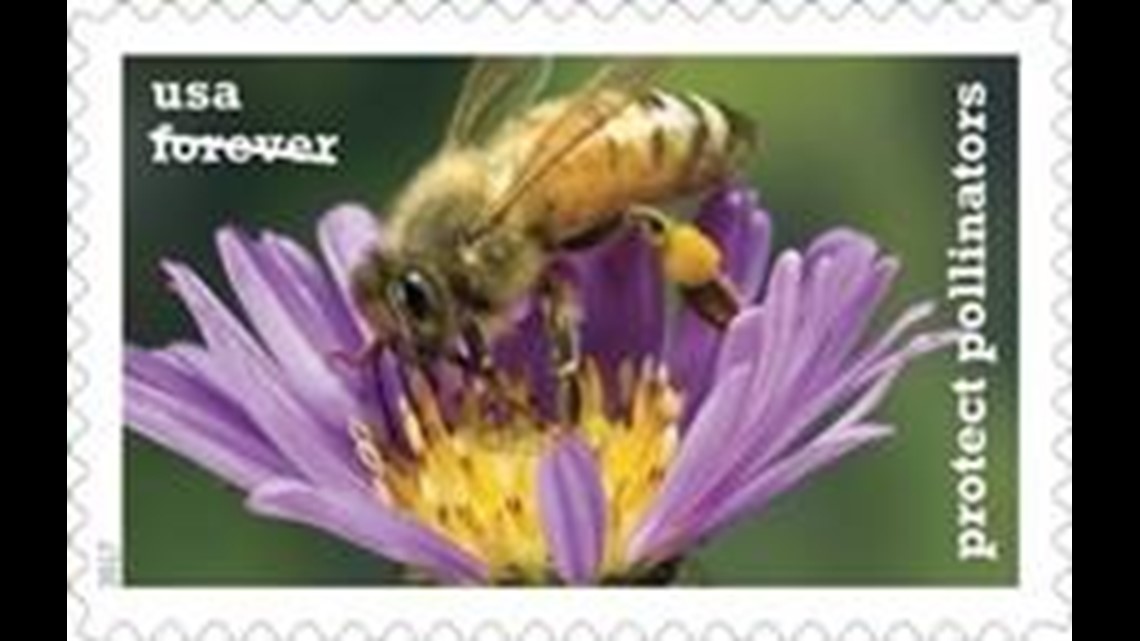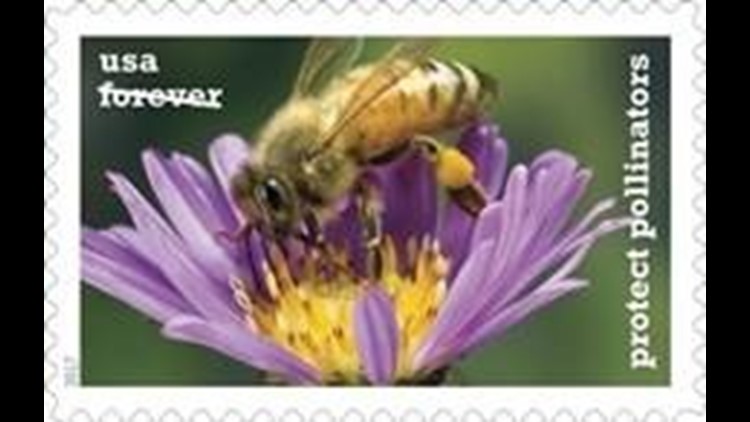

RICHMOND, VA — The United States Postal Service will unveil a new group of stamps paying tribute to North America’s most iconic pollinators — the monarch butterfly and the western honeybee.
The Protect Pollinators Forever Stamps will be dedicated Thursday at the American Philatelic Society National Summer Convention Stamp Show in Richmond.
“Bees, butterflies and other pollinators sustain our ecosystem and are a vital natural resource,” said U.S. Postal Service Judicial Officer Gary Shapiro, who will dedicate the stamps. “They are being threatened and we must protect them.”
Pollinators are a vital part of plant reproduction, shuttling pollen from blossom to blossom. The plants benefit; pollination allows them to produce seeds that bring on their next generation. Humans also benefit; insect pollinators help produce about one third of the food we eat, particularly fruits and vegetables.
Monarch butterflies (Danaus plexippus) and western honeybees (Apis mellifera), also called European honeybees, are two of North America’s most iconic pollinators. Monarchs can flutter thousands of miles in one of nature’s most wondrous migrations, a multigenerational round-trip that can cross southern Canada, the north-south breadth of the contiguous United States, and deep into Mexico, where they rest for the winter before returning north.
While western honeybees do not naturally migrate such distances, beekeepers truck their hives on long-haul migrations, accommodating agricultural growing seasons around the nation. These bees are far and away the continent’s most vital pollinators, servicing almond, citrus, peach, apple and cherry tree blossoms, plus the blossoms of berries, melons, cucumbers, onions and pumpkins, to name just a few. Surpluses of honey, created from nectar by honeybees as a nonperishable food source for their hives, is yet another benefit to humans.
In this modern world, these pollinators need mindful human intervention in order to thrive. The hives of western honeybees have lately been raided by parasitic mites and plagued by Colony Collapse Disorder, a mysterious condition which disorients bees and causes them to abandon their hives. While monarch butterflies, utterly dependent on milkweed plants throughout their range and specific mountain forests in Mexico, face collapsing populations as these habitats disappear to accommodate farming, urban development and illegal logging.
Throughout North America, efforts to halt logging, study the effects of agricultural herbicides and pesticides, and plant long swaths of flowers along stretches of highway and other such rights-of-way offer promise. On a grassroots level, individuals and groups can help provide for pollinators by planting locally appropriate flowers — a win–win for people and pollinators alike.
The Protect Pollinators stamps are being issued as Forever stamps. Forever stamps are always equal in value to the current First-Class Mail one-ounce price.
Ordering First-Day-of-Issue Postmarks
Customers have 60 days to obtain first-day-of-issue postmarks by mail. They may purchase new stamps at United States Post Office locations, at the Postal Store usps.com/shop or by calling 800-782-6724. They should affix the stamps to envelopes of their choice, address the envelopes to themselves or others and place them in larger envelopes addressed to:
FDOI – Protect Pollinators Stamps
USPS Stamp Fulfillment Services
8300 NE Underground Drive, Suite 300
Kansas City, MO 64144-9900
After applying the first-day-of-issue postmark, the Postal Service will return the envelopes through the mail. There is no charge for postmarks up to a quantity of 50. For more than 50, customers are charged
5 cents each. All orders must be postmarked by Oct. 3, 2017.



